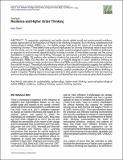Files in this item
Resilience and higher order thinking
Item metadata
| dc.contributor.author | Fazey, Ioan Raymond Albert | |
| dc.date.accessioned | 2010-12-06T18:56:02Z | |
| dc.date.available | 2010-12-06T18:56:02Z | |
| dc.date.issued | 2010-08 | |
| dc.identifier | 4711835 | |
| dc.identifier | 195534fe-2fc8-4825-b129-040537e84b3e | |
| dc.identifier | 77958475722 | |
| dc.identifier.citation | Fazey , I R A 2010 , ' Resilience and higher order thinking ' , Ecology and Society , vol. 15 , no. 3 , pp. art 9 . | en |
| dc.identifier.issn | 1708-3087 | |
| dc.identifier.uri | https://hdl.handle.net/10023/1623 | |
| dc.description.abstract | To appreciate, understand, and tackle chronic global social and environmental problems, greater appreciation of the importance of higher order thinking is required. Such thinking includes personal epistemological beliefs (PEBs), i.e., the beliefs people hold about the nature of knowledge and how something is known. These beliefs have profound implications for the way individuals relate to each other and the world, such as how people understand complex social-ecological systems. Resilience thinking is an approach to environmental stewardship that includes a number of interrelated concepts and has strong foundations in systemic ways of thinking. This paper (1) summarizes a review of educational psychology literature on PEBs, (2) explains why resilience thinking has potential to facilitate development of more sophisticated PEBs, (3) describes an example of a module designed to teach resilience thinking to undergraduate students in ways conducive to influencing PEBs, and (4) discusses a pilot study that evaluates the module's impact. Theoretical and preliminary evidence from the pilot evaluation suggests that resilience thinking which is underpinned by systems thinking has considerable potential to influence the development of more sophisticated PEBs. To be effective, however, careful consideration of how resilience thinking is taught is required. Finding ways to encourage students to take greater responsibility for their own learning and ensuring close alignment between assessment and desired learning outcomes are particularly important. | |
| dc.format.extent | 171546 | |
| dc.language.iso | eng | |
| dc.relation.ispartof | Ecology and Society | en |
| dc.subject | Epistemology | en |
| dc.subject | Resilience | en |
| dc.subject | Systems thinking | en |
| dc.subject | H Social Sciences (General) | en |
| dc.subject | B Philosophy (General) | en |
| dc.subject.lcc | H1 | en |
| dc.subject.lcc | B1 | en |
| dc.title | Resilience and higher order thinking | en |
| dc.type | Journal article | en |
| dc.contributor.institution | University of St Andrews. Scottish Oceans Institute | en |
| dc.contributor.institution | University of St Andrews. Geography & Sustainable Development | en |
| dc.contributor.institution | University of St Andrews. School of Geography and Geosciences | en |
| dc.description.status | Peer reviewed | en |
| dc.identifier.url | http://www.ecologyandsociety.org/vol15/iss3/art9 | en |
This item appears in the following Collection(s)
Items in the St Andrews Research Repository are protected by copyright, with all rights reserved, unless otherwise indicated.

